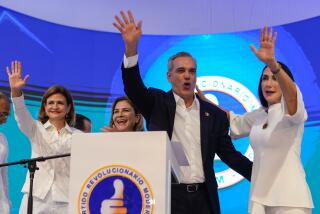Jamaica Vote Puts Socialist Back in Power
- Share via
KINGSTON, Jamaica — Former Prime Minister Michael Manley, a one-time radical socialist who led Jamaica to near-collapse in the 1970s, swept back into power Thursday with a landslide victory in an election marred by sporadic violence and charges of fraud and voter intimidation.
With almost two-thirds of the vote counted, Manley’s People’s National Party led the Jamaica Labor Party of Prime Minister Edward Seaga in 43 of the nation’s 60 parliamentary voting districts.
Seaga, the Reagan Administration’s closest ally in the Caribbean, had bitterly complained even before the polls closed that the election was “the most fraudulent” that he has seen in 30 years of public life. He charged widespread vote stealing and intimidation directed against followers of his party.
Manley, a one-time ally of Cuba’s Fidel Castro who now says he is a political moderate, also complained of voting irregularities directed against his party. Manley rejected Seaga’s charges as “a pathetic excuse for the anticipated defeat of the JLP.”
But in a brief speech conceding defeat less than six hours after the polls closed, Seaga indicated that he will not contest the results. “We shall take our defeat with a smile,” he said.
A few minutes later, Manley asked an exultant crowd at his own headquarters “to take this victory with dignity and with humility.”
“I want you to remember the election is over. You must not provoke people. You must not crow over people,” he said, adding that “when an election is over, we who win have a special responsibility to respect those who lose.”
Manley said he will seek to meet Seaga soon and urged members of both parties to work together.
One Fatal Victim
A 25-year-old pregnant woman was shot to death in one of a number of election shooting incidents in and near the capital city that left at least four other people wounded. But the violence appeared to have been confined to relatively few urban districts, with the voting proceeding peacefully through most of the countryside and along the rich north coast where the luxury tourist resorts are concentrated.
Foreign journalists and other observers who toured polling places in Kingston and nearby St. Catherine parish, or county, reported isolated clashes between supporters of the rival parties and some instances of ballot box theft and other irregularities. But most of the voting took place in a peaceful atmosphere, which made it appear unlikely that the overall results could be challenged successfully.
Radio-dispatched security troops of Jamaica’s 3,000-man army and 7,000-man police force rushed to trouble spots throughout the day, occasionally firing in the air to separate rock-throwing and jeering rivals who crowded near polls in the poorer areas of Kingston. Eight military helicopters made frequent sweeps over the most heavily populated areas.
“We thought it would be chaos at first, but we got everything under control early. Voting at most of the polling places has gone smoothly,” said a senior officer at the St. Catherine parish police headquarters at Spanish Town, west of Kingston.
Both Seaga and Manley circulated throughout the day among polling places in the city, at risk of becoming the focus of turbulence as they sought to quell the anxieties of voters and poll officials.
At one Kingston poll, Manley and a group of about 30 People’s National Party followers were virtually besieged in a voting office by twice that number of Labor Party supporters, but security forces arrived before trouble erupted.
Seaga tensely thrust a Cable News Network cameraman aside at another polling station, knocking him into an angry crowd of Labor Party voters who seized the video-cassette from his camera. The prime minister later issued a public apology and invited the CNN crew to rejoin his entourage.
Manley, the apparent winner, was prime minister from 1972 to 1980 when he lost a landslide election to Seaga after a prolonged election campaign that left more than 700 dead. Then a radical socialist, Manley forged close ties to Castro, inviting hundreds of Cuban advisers to Jamaica. His economic experiments, which included nationalization of some industries, state-run farms and rejection of the International Monetary Fund, alienated local businessmen and the international financial community.
His support of Third World causes and close ties to Castro led to increasingly sour relations with the United States, which virtually cut off aid to Jamaica when the socialist prime minister endorsed the dispatch of Cuban troops to Angola.
In recent years, however, a self-described “more laid-back Manley” has claimed that he has learned from his mistakes and no longer will pursue his radical causes of the past. In a measured and deliberate campaign, he has mended fences with Washington and the banking community and pledged no more nationalization of industry as well as support for private enterprise in the future.
Although he said he will establish “moderate” diplomatic relations with Communist Cuba, forging solid relations with the Bush Administration in Washington will be his first priority.
Seaga has been Washington’s closest friend in the Caribbean since he became the first foreign leader to visit President Ronald Reagan after his inauguration in 1981. He boasted of playing a leading role in the formation of Reagan’s Caribbean Basin Initiative which has been responsible, in part, for Jamaica’s return to economic solvency following near-collapse under Manley.
In 1983, riding a wave of popularity for his support of the U.S. invasion of leftist-ruled Grenada, Seaga called a snap election that Manley’s party boycotted, giving Seaga’s Labor Party a clean sweep of the 60-seat Parliament.
Thursday’s election was the first to be contested in Jamaica since the bloody 1980 Seaga landslide.
More to Read
Sign up for Essential California
The most important California stories and recommendations in your inbox every morning.
You may occasionally receive promotional content from the Los Angeles Times.













